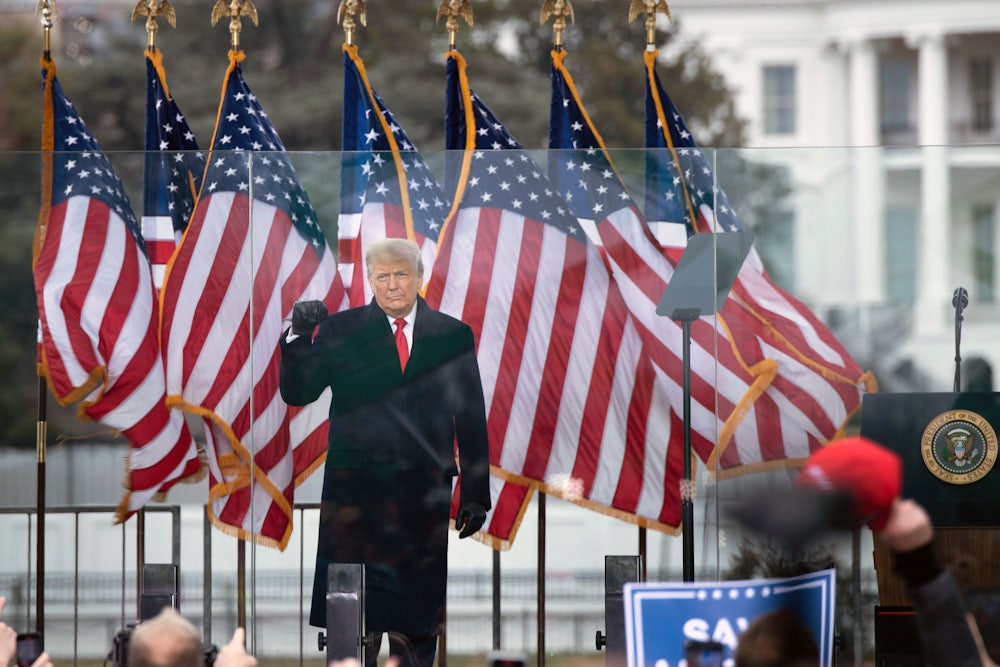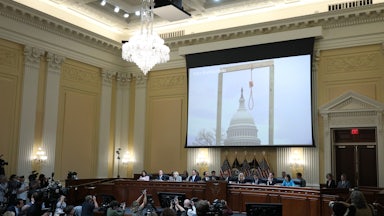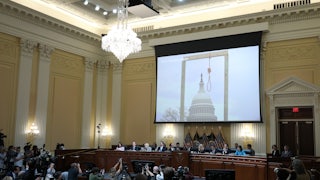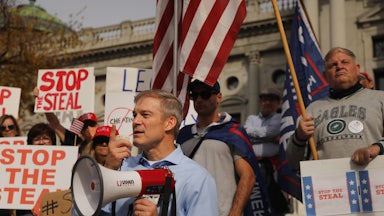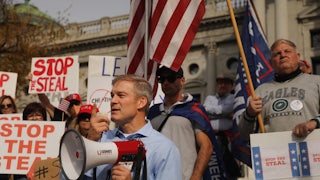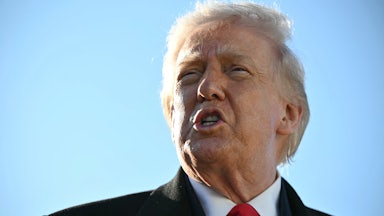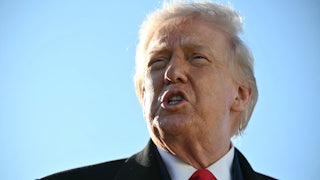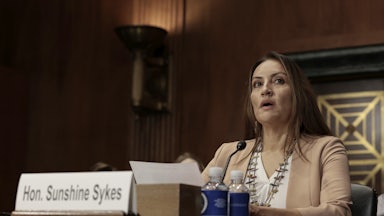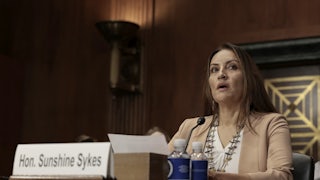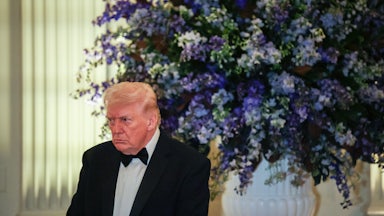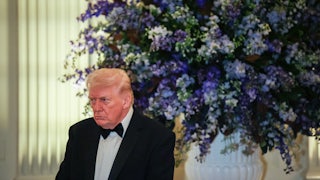This week, the January 6 commission dominated the headlines with a surprise installment of its televised hearings, featuring former White House aide Cassidy Hutchinson—whose eyewitness testimony included several bombshell revelations that spoke to President Donald Trump’s knowledge and intent on the day his rallygoers stormed the Capitol. But the commission may have a few more plot twists to come when it resumes its public hearings in July, thanks to British documentary filmmaker Alex Holder.
News broke late last week that Holder has emerged as a “key witness” for the commission, which had also subpoenaed footage from his upcoming documentary series, Unprecedented, which will air this summer on Discovery+. The series is aptly named: Holder and his crew were given extensive access to the Trump White House and the Trump family during their reelection campaign, through Election Day and the weeks beyond—when the president and his loyalists ramped up the rhetoric that would touch off the Capitol riot on January 6, 2021. Holder continued to film and speak to Trump and his family even after he left office two weeks after the riot.
In an interview with The New Republic conducted the day after news of his involvement with the January 6 commission broke in The New York Times, Holder discusses how his access to the first family came about, his impressions of Trump’s mindset during his final days in office, and the inevitability that his work would end up under the January 6 commission’s lens. On that matter, Holder leaves no doubt: “January 6 was expected,” he said. “I predicted it was going to happen the day before.”
Holder’s upcoming series, Unprecedented, which follows Trump and his family from the fall of 2020 until the end of his presidency, premieres this summer. This interview has been edited for length and clarity.
How have your last few days been?
It’s completely insane! It’s all crazy. The thing that was sort of unusual was how it coincided with this investigation and that just catapulted into a different stratosphere.
How did your documentary come about?
We started filming in September [2020] and then were filming through the summer of [2021] and then past that as well—after we finished with the Trumps, we then interviewed a few journalists to give context to the project. So filming sort of went on throughout 2021. We were editing as well, putting the three episodes together throughout the year. We were also doing interviews while we were doing postproduction. We only really finished it recently—we delivered to Discovery+ not that long ago. Then the film was subpoenaed a couple of weeks ago.
How did nobody know about this until so recently?
I think it was a few things. Number one is that no one knows who I am. Two is that it’s rich coming from the Trumps, who are saying, “We didn’t know about this.” We weren’t doing anything surreptitious. There weren’t hidden cameras. This wasn’t a joke. We were given access. The White House is probably the most secure building in the world. You cannot get into the White House in a secretive way, especially with a film crew. We went in and were fully visible and transparent.
On the campaign, my [director of photography] was on the stage with Eric and Ivanka at multiple rallies. So much so that on one occasion CNN rang one of the campaign staff to say, “Who the hell is this guy on the stage who is basically interrupting our shot?” He was so close to the president at certain rallies that he was closer to him than the Secret Service. We were on Air Force One! That’s a big deal even for administration people.
How was the level of access you received different from what other members of the press were getting?
It seems that there were certain things that happened that were slightly unusual. It wasn’t unusual for us because I hadn’t been on Air Force One before—the whole thing is unusual! The Trump interview took place in the Diplomatic Reception Room—it’s this beautiful corridor with this red carpet, and then there’s a few rooms. There’s that beautiful room, and next to it is another room. They basically put a partition in the corridor between that side and the other side, which is into the East Wing, where the first lady is—they partitioned it off so that no one could see what was going on. At the time, I thought that it was just because it’s the president. But maybe it was because there was press next door and they wanted to keep them not aware of what was going on in the other room. With the plane, they rushed us past the press areas and moved us into the middle of the plane into a conference room. I wonder whether or not they were keeping us away from the press.
We didn’t speak to anyone about the project, but that was the result of my decision to keep the thing quiet because it’s all kind of absurd. [laughs] But no one told us we had to: I just made it a prerequisite that anyone who worked on the project had to keep quiet about it. That was a sensible thing that I would do on almost any project I would work on.
There was no sense, at any point, that the Trumps thought they had editorial control over the project when they were talking to you?
Absolutely not! What’s out there in terms of material that people have seen is pretty indicative that this is a very robust and fair film. It’s just a bit ridiculous that they would say that they had editorial control. In my mind, a film that the Trumps were going to make themselves most definitely would not include the January 6 insurrection. They probably would want to make sure that the filmmaker making it espoused their position.
I’m not American. I don’t have any political spin in American politics. I’m happy to just stand by the position of the series, which is that there is a clear trajectory from their rhetoric at campaign rallies to the events that took place on January 6. That’s essentially it.
How did you get access to the Trumps?
I met [Jason Greenblatt, an attorney who worked for the Trump Organization and who also worked on the Trump administration’s Middle East peace plan] … via another project I’ve been working on, which is about the Israeli-Palestinian conflict, which I’ve been working on for a few years. He had just left the White House, and I wanted to interview him about his experiences there. Then we sort of became friendly and were talking about different ideas, and it led to this project.
Did you expect the subpoena?
I thought it was inevitable. The amount of research and investigators they had on this, it was absolutely inevitable that one way or another they would become aware of it.
Did anything stand out about what you were asked about by the committee?
It was all pretty much about the material we had provided to them. They wanted me to give context to the material, which is what I did. They were very professional and respectful and to the point. The consensus among basically everyone from the committee to the media is that this whole thing is quite incredible and unusual. I don’t think it’s ever been done before: Access to the president of the United States by an independent film crew, regardless of how many films they’ve made, is unheard of.
Why do you think the Trumps were so keen about having you do that?
I wanted to tell a story about who these people were. Let’s actually find out who they actually are. They’re the most fascinating, controversial family in America—probably even in the world. Let’s explore who they are and what they have to say. Now, this was taking place during the election campaign. Obviously, that was going to be part of the narrative. I believe that they saw this as an opportunity to document what they believe is going to be their second wind. They genuinely believed, without a doubt, that they were going to win the election. This was back in September of 2020.
[I think they saw me and thought,] “Here’s a guy who doesn’t have any experience with American politics. He’s British, he’s foreign, and we feel we’re going to win, so why not?” So that was one aspect. The other was my British charm, perhaps. [laughs]
Do you think the fact that they had so ruthlessly divided up the American media into good and bad, loyal and disloyal, helped your cause, given that you were coming in without a clear agenda or allegiances?
This may sound pretentious, but my allegiance is really just to documenting the truth and history. We got whatever we could get. My approach wasn’t to push more than what was appropriate, and they cooperated as much as they were willing to cooperate. We just did what we could do, and we ran with it. We didn’t tell them to contest the election results in 2020 and create a situation that resulted in one of the most tragic incidents in American political history. And I don’t think while that was happening they really had much concern about what we were doing. It was what it was. And we were there. We captured it, and we told the story. What’s really important: Documentaries—the ones I want to make, the ones I love—are those where you don’t know what the ending is when you start. It evolves and it moves.
I was just trying to understand who these people were. But by virtue of practicality, it’s happening in tandem with the campaign. That’s the main thrust of the project. There’s also these other aspects of the project as well: You get to see the family [in a way] that’s quite unique and quite insightful.
When you were cutting the film, what stood out to you that didn’t stand out at the time you were shooting?
It’s completely enveloped in this unusual situation: There haven’t been any films with all three of the kids in one film, talking about their father. One of the things that was quite interesting was Eric and Don speaking about the impact their parents’ divorce had on them. Don also, in his own words, was talking about what he was like as a kid and talking about becoming a bartender. I was also quite interested in how they explained their political positions and where their political positioning comes from.
At the end of the day, the idea that the sitting president of the United States is sitting across from me—we believe it was the last interview that he did in the White House. He had otherwise sort of barricaded himself in the White House. I’m sitting there, he comes in—this is not a campaign rally, he’s not speaking to his supporters—and just goes on for essentially 20 minutes or so about how there’s no way “that guy”—referring to President Biden—got 80 million votes. What I find really interesting is that a lot of the questions I’ve been asked on TV and by reporters are about if I think he’s lying or if he believes in what he’s saying. It seems that people want to say that I found that he is lying.
A lie requires thought. It requires a certain amount of intelligence—at least in one sense. It requires a rationality. The person knows they’re lying, and there’s a reason why they’re lying. Once you can prove a lie to be wrong, then that person generally backs down. You can’t have a rational conversation with someone who believes in something that isn’t true—the key word being believes. Donald Trump’s entire thesis, as far as I can see, has always been that one plus one equals three. Does he believe that one plus one equals three? I don’t know. But when every single person in the world is saying there is absolutely no evidence that the election was stolen—you’ve also gone through all the legal processes and they’ve all concluded that there [are] no election irregularities—to still conclude that the election was stolen? I actually think that it’s more dangerous that he believes what he was saying than if he was simply continuing with this lie. That’s more dangerous. He really truly believes that.
Do you think it matters if he believes or not?
It matters in terms of the end result. In this case, the end result was that a mob broke into your Parliament and attempted to assassinate the vice president. I believe they were trying to also go after the speaker as well. It matters in terms of semantics.
People would ask me if I pushed back about his position in terms of the election or the insurrection. I’m not the story. This is not like TV interviews that happen in America or the U.K. where you have two cameras: one pointed at the interviewer and one at the interviewee. I’m barely in this documentary. This film is not about me. It’s about the Trump family. And it’s not for me, it’s for everyone who watches it.
My role was to ask him questions, and he answers. I don’t want to push him, a person who is telling me that one plus one equals three. Trying to dissuade him away from his position is not my job and will just waste time. In documentaries, it’s all about maintaining the relationship. Why do something that’s foolhardy and ends with him saying the same thing? I don’t get anything more, and I then lose access. I don’t think it’s the correct approach. At the end of the day, what he said is what he said.
At what point did you start to realize that the insurrection was coming?
January 6 was expected. I predicted it was going to happen the day before. I half-joked to our [director of photography] that it was going to happen, and we made a plan for the eventuality that it would. I would move equipment to my car so he would have the ability to cover what was going on.
We have been following on the campaign trail for six weeks. Whilst American politics and elections in particular are entirely different than the U.K., the noise, the rhetoric, the belligerence that was happening during the campaign was very high. Comments like “we need to fight” and “we need to kick ass” and “protect our babies.” It was a real battle. That noise was coming out. And then obviously after the election that went on to another level. And then you add on to that the fact that the president of the United States is saying that the election was rigged and that 75 million votes didn’t count. He started that well before the election. He’s on the record saying that there were irregularities even in the 2016 election. It wasn’t surprising when he then lost and said there were irregularities and then maintained that position over and over and over again over November and December.
What did you expect was going to happen? You have a big rally on the day when there’s this ceremonial count of the votes, and you bring all your supporters there, and you double down and triple down.… It was so bombastic and loud and dangerous. Obviously that day was horrific. Michael, who shot all the material on January 6, was right outside the Capitol with the mob. He captured some extraordinary material that has never been seen before that I believe will actually define that day in a visual way—there’s material there that’s absolutely, totally remarkable. And horrific.
It seems like you actually were able to talk to the kids as human beings and not as the caricatures they’re portrayed as—and that they themselves portray.
I think because there has been so much focus on the committee and January 6 that people have overlooked the Succession-like vibe of the three siblings—who is going to take over from the father and become the king of the Trumps? … Don Jr. talked a lot about how his politics were very much defined by his early upbringing, which was very interesting. I don’t want to give too much away because I think his analysis of his early life and how it translated into his beliefs today is something that people might be quite surprised at. The interactions that the three of them have and what they said to me and how certain things played out after the election [were] interesting. Whilst there’s this conflicting testimony with regard to Ivanka, which everyone is talking about—there’s no doubt what Ivanka was doing toward January 6 was less than what Don Jr. was doing. At the Georgia rallies, Don was incredibly vehement and belligerent, whereas Ivanka was more quiet. While she was present for these things, she didn’t say as much as Don did in terms of the election being rigged. The differences between the kids are interesting. And then there’s the question of who is the likely successor.
Who is the likely successor?
That’s the conclusion of the film. I can’t say it here, but I did answer that question to the committee.
